follow the vineyard
-
What is Grape Veraison
July 21, 2022 12:34
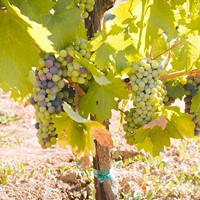
UNDERSTANDING GRAPE VERAISON
Each summer, grapes begin to change color in our Dry Creek Valley zinfandel vineyards. Grape veraison is the beginning of ripening, when red grapes change from green to purple colors. Veraison usually begins in July during moderate weather years, but in cooler vintages, zinfandel grapes don’t start changing color until late July, even early August at times. During ideal weather conditions, the time from coloration to harvest is typically about forty-five days.
There’s much more to grape veraison than the fascinating color change we can see with our eyes. To allow vines to focus all their energy into the existing clusters hanging on their shoots, the grapes cease growing during this period of their lifecycle. This allows sugars to increase and acids to decrease.
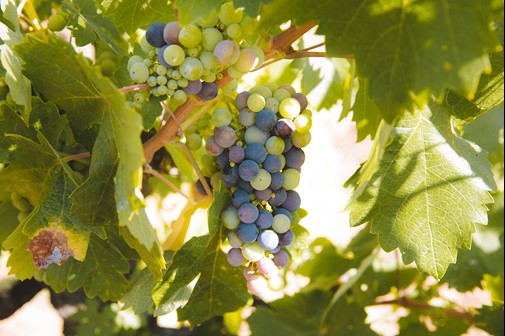
WHY EVEN GRAPE VERAISON IS IMPORTANT
Winemakers want the grape clusters to go through veraison quickly, because the uniformity of coloring within the clusters equals uniform flavors at harvest time. Being able to harvest uniformly ripened grapes is one of the keys to making a velvety, balanced Pedroncelli Zinfandel. If some grapes in the clusters are under-ripe, some perfect and some overripe, the finished wine will express some combination of too dry, too fruity and even too hot or high in alcohol. Only uniformly colored zinfandel grapes can make a balanced, smooth wine.
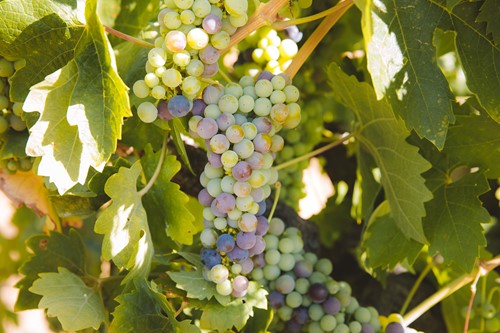
ADDRESSING UNEVEN COLORS DURING VERAISON
The warmer the weather, the more likely the grapes will change colors swiftly and uniformly. So, what does a winemaker do when the grapes change color unevenly? At Pedroncelli, we wait until veraison has taken 80% effect on our zinfandel vineyards, then we’ll start to trim off the “wings” and clusters that are still green. This sacrifice ensures the remaining grapes on the vine develop consistent flavors which will translate later into the wine.
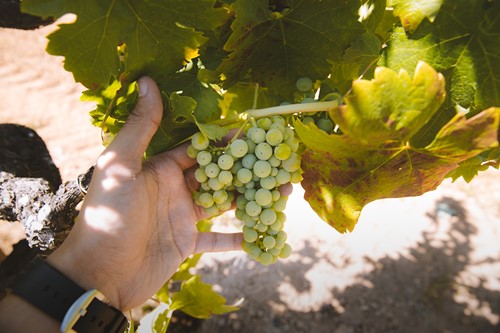
Here's an example of a cluster with a “wing.” A wing is a small bunch that shares the same shoot as a fuller cluster.
During ideal growing seasons, moderately warm temperatures help veraison happen at a perfect pace. Zinfandel, Cabernet Sauvignon and Merlot grapes start changing color in Dry Creek Valley during July and August, depending on when vineyard pruning occurred and the microclimate of each vineyard. In an average year, Pedroncelli’s Dry Creek vineyards complete veraison over two to three weeks.
DO GRAPES CHANGE COLOR AT DIFFERENT TIMES?
Different red grapes varieties go through veraison at different times. Just like during harvest, we don’t always pick the same grapes at the same time. It is spread out over several weeks. If Zinfandel is in veraison now, then we’ll be picking about the second week of September. Cabernet Sauvignon on the other hand has not even started veraison and we’ll expect to pick these grapes at the end of September or beginning of October. It always depends on the weather between now and then too.
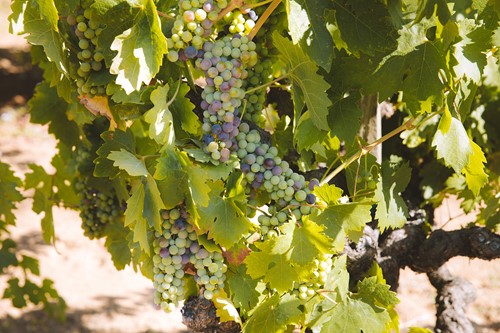
Follow us on social media to stay up to date with our harvest season.
-
Follow the Vineyard: Crop Set
June 26, 2020 13:42

Following the vineyard was supposed to be a monthly event series that we had planned out for the tasting room. We envisioned guests coming to the winery each month to follow our Mother Clone Zinfandel vineyard from budbreak through harvest and beyond. Well COVID19 put a stop to that as the first Saturday (Bud Break) was set for March 21st. Here we are in June with the vineyard well on it’s way to vintage 2020 having been on a growing spurt ever since. Nature hasn’t recognized our sheltering in place and the growth of summer will soon be harvested in the fall.
I checked in with Mitch Blakeley, fourth generation family member, who works alongside his father Lance Blakeley and is our Vineyard & Operations Manager. I was curious how things were going and he filled me in with the latest.
The bloom phase was over by the first week of June and the crop set began. It has been busy as the vineyard crew works to finish the last of the suckering before the shoots become too hardened and difficult to remove easily. A vine likes to grow and sometimes overdoes it. Suckering or taking off the shoots and extra growth allows the vine to focus its’ energy on the crop at hand rather than all the extra foliage and fruit-think of it as managing expectations.
Managing the vineyard also includes clean-up work, like weeding, disking, trimming and tucking, pinching down the canes to guard against sunburn. The new bunches forming, as seen above, are susceptible to burning if the leaves don’t cover them. Irrigation has begun due to the high heat experienced over the month and the vines are given just enough water to sustain them. Crop thinning is also taking place in some of the Zinfandel blocks-leaving a good sized crop that will also ripen more evenly with less fruit on the vines.
Mitch mentioned it was unusually hot this month with many days topping out at the mid-high 90s. I remember June as a cooler month and we have had the challenge of rain during bloom and crop set (2011) as well as what is known as June gloom (2005 for instance). I also wanted to see if we had experienced high heat and found a blog post from June 2017. Here is what we experienced then:
“What happens in the vineyard when summer hasn’t even begun and we have one of the hottest days on record? On Sunday June 18th the temperature hit 110 degrees in our little corner of Dry Creek Valley. The days that followed were not much better and the mercury wavered between the mid 90s to over 100 degrees again on Thursday.
It isn’t the first time the month of June has seen this heat and it does some good to know the following week we had our fog back in the evenings with pleasant temps in the low 80s. I asked our Vineyard Manager Lance Blakeley to explain a few things to me. How does he prepare? What happens to the fruit? Was it a good time to have a heat wave?
First of all he was ready for the heat-farmers are always weather watchers and he and the crew prepared the vineyard for what was coming by drip irrigating the ranches, which totals 105 acres. This in and of itself helped the vines to survive the brutal heat which hit on the 18th. The fruit was protected by the canopy of canes and leaves. There was little to no scorching of the green berries. If there was a good time to have a heat wave this was it-if it had occurred during bloom time we would have a more drastic story to tell.
I learned something too. The leaves actually move to cover either the stem or the fruit, whichever is in danger of scorching. One way to test if the vine is keeping cool is to feel the leaves-if they are cool then they are safe. If they are warm to the touch then they need some help as they’ll begin to wilt and become overwhelmed by the heat. Kind of like people-we wilt when it becomes too hot and just want a cool drink of water. The good news is the vineyards become acclimated to the heat by this first wave.”
Getting back to vintage 2020, as the clusters size up over the next couple of weeks, July will bring the next stage-veraision-for now we’ll see what the next month brings in the form of weather and toast the coming harvest with a splash of vino in my dino.
Categories
- COVID
- Follow the Vineyard
- Note from Home
- PairItWithPed
- Pandemic
- pedroncelli
- Port
- Postcards from Home
- Pruning
- Seasons in The Cellar
- Tasting Room
- Thanksgiving
- Vintage Notes
- Winemaking
- Women's History Month
Recent posts
-
91 Years Later
-
Come Over October: It's About Community
-
Come Over October
-
A Legacy Continues!
-
Everything Old is New Again
Popular tags
- Crop set
- Pedroncelli
- Pandemic
- Finding Your Roots
- Pantry
- Block 007 Cabernet Sauvignon
- food and wine
- Anniversary
- COVID19
- Heat wave
- Cabernet Sauvignon
- COVID Coffee Chat
- Cellar Master
- note from home
- Rosé
- Dry Creek Valley
- Pruning
- Bushnell Vineyard
- Sauvignon Blanc
- Estate Vineyard
- Homecooking
- PairitwithPed
- Down to Earth
- Harvest 2022
- Mother Clone
- 1974 Cabernet Sauvignon
- Barrels
- Four Grapes Port
- French Oak
- Reserve
- Courage Zinfandel
- Follow the Vineyard
- Recipes
- Library Wine
- Merlot
- Holding steady
- Cookies
- Lake Sonoma
- OpenThatBottleNight
- cooking with wine
- American Oak
- cheese
- Habit
- Seasons in The Cellar
- Sonoma County
- Schotzki
- Oak
- Easter
- newsletter
- family









